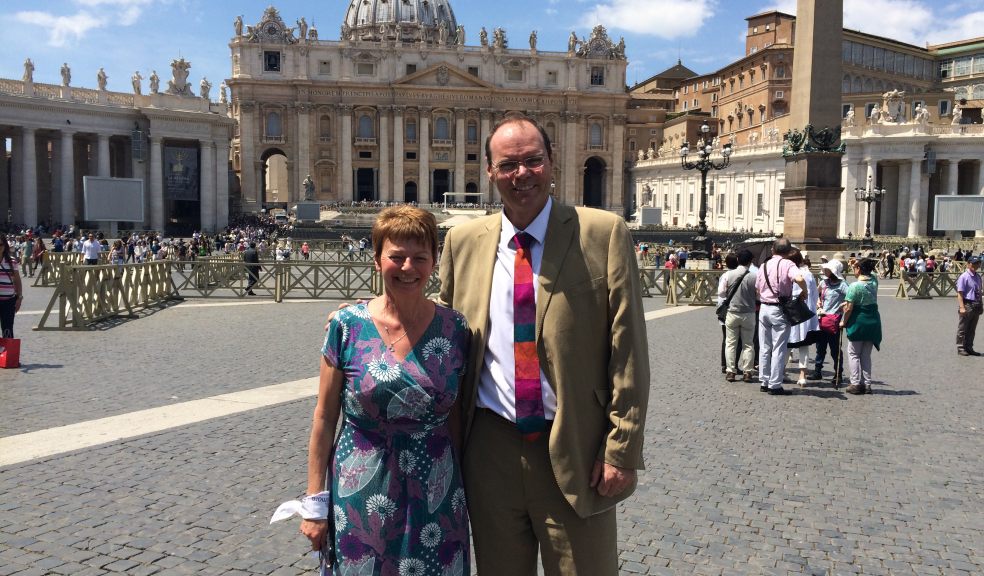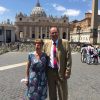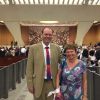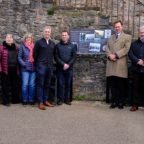
Exeter research duo meet the Pope
A South West neurology research consultant and nurse had the experience of a lifetime as invited guests of the Pope in the Vatican City to raise awareness about Huntington’s disease.
Royal Devon & Exeter hospital Consultant Neurologist Dr Tim Harrower and Senior Neurology Research Nurse Sarah Irvine were among invited international guests of Pope Francis. It was the first ever Papal audience with people affected by Huntington’s disease.
Huntington’s disease is an inherited condition that damages certain nerve cells in the brain which progressively worsens over time and can affect movement, cognition (perception, awareness, thinking, judgement) and behaviour.
The Royal Devon & Exeter NHS Foundation Trust has conducted clinical research studies for Huntington’s disease for seven years. Over 50 participants currently travel to Exeter, from as far afield as Cornwall and Wiltshire, to take part in this research. Three of the studies currently open for recruitment at Exeter are supported by the National Institute for Health Research.
In his address to Huntington’s sufferers, their relatives, caregivers, researchers, and advocates on Thursday 18 May 2017 in the Paul VI Hall, Pope Francis said, “For far too long, the fears and difficulties that characterise the life of people affected by Huntington’s disease have surrounded them with misunderstandings and barriers, veritably excluding them.”
The Holy Father went on to say, “In many cases the sick and their families have experienced the tragedy of shame, isolation and abandonment. Today, however, we are here because we want to say to ourselves and all the world: ‘HIDDEN NO MORE!’”
He encouraged researchers to continue their work, and called for concrete solidarity in this regard, in a manner consistent with the inherent and unalienable dignity of the human person. The audience with the Pope was in the week of International Clinical Trials Day.
Dr Harrower said: “As the first world leader to publicly recognise the plight of patients and their families with Huntington’s disease, Pope Francis has taken the bold step to ensure that this condition does not remain hidden which is the focus of a charitable movement called HDdenomore (pronounced hidden no more).
“Pope Francis demonstrated his humility by taking his time to bless every single one of the patients with Huntington’s disease who had travelled from as far afield as Venezuela and New Zealand. For me personally the Pope was inspirational in his thoughts and ethical perspective about research in this disease which he discussed with passion during his address to our small but truly international group gathered in the Vatican City.”
In Exeter Dr Harrower said the clinical research is looking at all aspects of Huntington’s disease from Biomarkers at the time of diagnosis and during the life of patients through to longitudinal observations of the effect of the disease. The RD&E is also collaboratively supporting recruitment of participants for studies in other parts of England in this field.
Describing the visit as being ‘hugely symbolic and significant’ Sarah Irvine said: “Much of the modern understanding of Huntington’s disease originated from Venezuela - a strongly Catholic country - and the disease presents ethical implications.
"For Pope Francis to embrace those affected and meet the scientists and clinicians working in this challenging field and who deal with ethical dilemmas on a daily basis, will hopefully change the way this disease is thought of and give hope to those living with it.
"Huntington’s disease is in many regards still a hidden disease with a lot of stigma associated with it. Having a world leader taking an interest in what is happening regarding Huntington’s disease can only be a positive influence.”




















